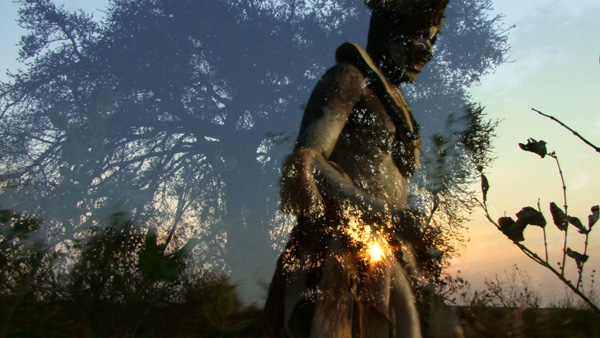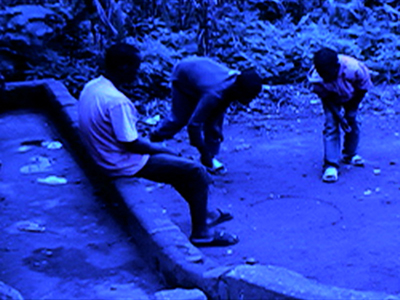.jpg)
Unreal Forest by Jakrawal Nilthamrong 70 minutes 2010
This broken, postmodern fairytale opens with a mystery shaman voyage, beautifully shot, and then promptly relapses into the movie’s own prehistory, showing Thai director Nilthamrong holding auditions for a director so that he can stretch his short movie money into a feature length effort. He has money as part of a project called Forget Africa, and is in search of someone who can make a movie inside his movie. Once the director is finally in place, casting begins, but while they mull over local possibles, a stooped woman sweeps the dust away from their pink house, the trees are moving in the wind, all around them the natural and unnatural worlds are turning. Nilthamrong visits washing women and local hangabouts while the camera drifts behind him, locked down on a tripod where the dustbowl teens gather to rehearse their martial arts posings. Slowly, a sideways look at community is forming, in accidental glimpses, in patient frames and episodic intervals. Half an hour into the film, the opening thread is picked up again, and we see the shaman healer being led into the village where a sick boy waits on his learned touch. Unfortunately, or so the story goes, the boy dies, the traditional dance is not enough, so he is gathered up in a basket and floated down the river like Moses, towards what looks like Victoria Falls which appears in its own extended cameo section, as if it were another actor in this movie. And perhaps it is. Tree actors, brick actors, grass actors. The background is foreground. Everything is alive here, and singing, especially the left behind graveyard with its exposed skeletons. Here are the ones who long to walk again, unearthed by the restless winds, no longer weighed down by organs like the heart.
“Deep in the middle of an African forest, Tamaya, a shaman who can connect to the dark side, is paddling on a canoe across a big river, heading towards an unknown land. His body is covered in white powder – the one used in holy rites. At the shore, Lunggeaw, a 60-year-old man is waiting for him. They head towards a small village where Lunggeaw’s son is lying sick from a mysterious illness. Tamaya promises the old man to find a way to cure his son. He covers the white magic powder on the sick boy’s body, and takes him into the woods. A ritual is performed in the middle of the forest to evoke the powerful spirits. But Tamaya finds out his is not able to cure the boy from the fatal illness. He tells Lunggeaw the boy has death awaiting him, but that the spirits in the woods reveals that the boy’s soul belongs to a great waterfall, and so they need to transport him there so his spirit could return to see his father again in a different form.”
“Jakrawal came with a quite different plan and quite different ambition to Zambia. While writing his idea about a movie within a movie, about letting an African director making a short movie and putting this movie and the process of making it in his movie – meta movie, yes – he saw the chance of making his commissioned short into a feature. Not that there was a feature budget, but more South East Asian movies have been made like that. So his first mission was to find an African director. When Jakrawal arrived from Bangkok in Lusaka Musola had already three candidates lined up for him. Juan Watson Mututa became the director. Non of the candidates had much film experience, but Watson’s idea turned out to be the best to realize within the budget. For Watson is was a nice opportunity to get some experience, in fact the productions must have been like an intense work shop for him. Not only was he director he also played director in the overall film by Jakrawal.
The village was just 20 minutes drive out of Lusaka, the capital of Zambia, but it felt we went to an other world and another time. The time people lived without electricity and running water in handmade mud houses. But that is Africa. The middle ages are just around the corner. Jakrawal Nilthamrong needed a traditional village for his fiction film Unreal Forest and he did not have to go far. We did had to go early, because in the first scene the village was just waking up. As told in the previous blog Jakrawal’s film follows the making of an African short film made by the young director Juan Watson Mututa (Watson in short). So on the set the film by Jakrawal and the one by Watson were melting into one. Watson had little experience with fiction filmmaking, but was well willing to learn from the young Thai masters. And so were others. The actresses had to run wardrobe- and make-up departments. An actor had the choice between no place in the bus or becoming a boom operator. The laws of South-East Asian low budget filmmaking have no mercy. You do something useful for no money or you are out. It was remarkable to see how a little film crew, about the size of a the crew of a news reporter, could bring the life of a complete village to a stand still for a complete day. Some villagers might have expected another kind of scenes. Not far from this village was the location of a popular television soap series. When I first asked Jakrawal to participate in this project he immediately admitted that he feared that Africa could be dangerous, but he also said he was interested. Later he never spoke about his reservations anymore. He just worked on an idea and was clearly motivated to go. Seeing him work in this dusty village I realized he had developed one of the most ambitious plans within the project. In fact he was trying to make an essayistic feature film with money that in fact was not even enough for a short film. To get this of the ground with such little means he needed magic (for this he brought master Go) and a lot of volunteers and free support. Things that in fact don’t exist in Africa (yes, the magic does exist, but not the working for free). So it was up to Jakrawal to convince the locals that he had a wonderful idea, but no money. I guess in the end it was the magic of cinema that helped him. Few things are so seductive as being part of the making of a movie (only being in a rock band can beat that).” (from the blog of Gertjan Zuilhof, programmer at International Film Festival Rotterdam)

